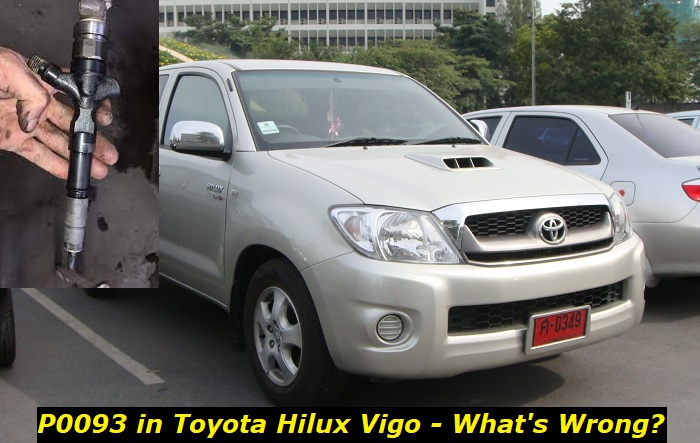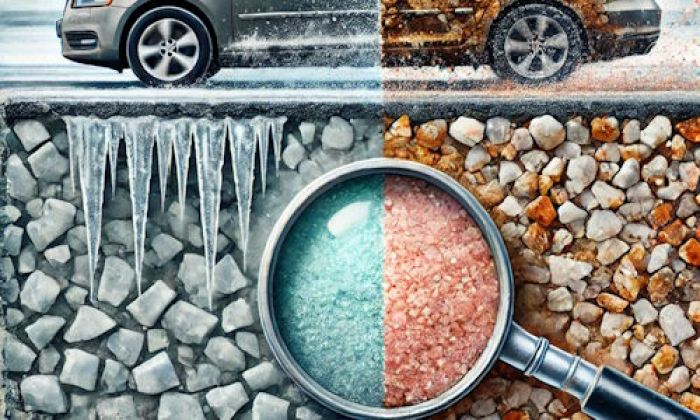So you've got yourself a Toyota Hilux Vigo - it's an excellent choice, a bulletproof workhorse that has proven itself through the test of time. It has been redeemed through many previous satisfied owners, and also in media - Top Gear and their quest to kill the Toyota Hilux springs to mind! However, the P0093 is dreaded by Toyota Hilux Vigo owners as it is a chronically occurring error that can be caused by a variety of issues.
P0093 code highlights
- Level of urgency:High
- Possible culprits:fuel leak, fuel pump problem, fuel lines issues, clogged fuel filter
- Price for repair:$100 - $550
- If neglected:Fire is possible, fuel loss can happen
- DIY repairs:Impossible
- Can you drive?Not recommended

What Is The P0093 Error Code in a Toyota Hilux Vigo?
The error message that comes with the P0093 error code states that there is a large fuel leak detected in the car's system. However, a fuel leak in this context does not mean that actual fuel is leaking from the bottom of your Toyota Hilux Vigo. The fuel leak that's been detected by the system means that there is a big loss of fuel pressure in the system as a whole.
Unfortunately, the cause of the problem can be external or internal, the P0093 diagnostic trouble code does not specify what the exact cause of the issue is.
Which Generation & Engines Are Affected By The P0093 Error Code?
The P0093 error code is a general DTC (diagnostic trouble code) that can affect many cars, not just the Toyota Hilux Vigo. However, the P0093 error code specifically affects diesel engines, not petrol engines.
As you may know, in internal combustion engines, the fuel is not ignited in its liquid form, but rather it is ignited as a vapor so it enters the combustion chamber in a pressurized and vaporized form. However, pressures differ drastically between petrol and diesel engines, as they have very different operating principles. In a petrol engine, the pressure of the fuel that is being injected can be between 30-70 in normal operating conditions, although if it uses direct injection the pressures can be much higher.
In contrast, in a diesel engine, fuel is squirted at much higher pressures, between 4,000 and 30,000 PSI (or 27 to 200 Megapascal, MPa). As such, it is integral to have the fuel system in perfect working condition to maintain these levels of pressure in a diesel engine. As you can see, having a fuel leak and therefore low pressure can affect a diesel engine in a drastic way.
Although getting the P0093 fuel leak error message is possible in all diesel Toyota Hilux models, the issue is, unfortunately, more prevalent and chronic in the seventh-generation Toyota Hilux models. This generation spans the model years between 2004 and 2015, although it is much rarer to encounter the P0093 diagnostic trouble code in later models.
The P0093 error is particularly more common in the 1KD and 2KD diesel Toyota engines. The models that had these engines, apart from the Hilux Vigo are as follows:
1KD:
- Land Cruiser Prado,
- 4Runner (also known as the Hilux Surf in other markets apart from North America),
- HiAce,
- Fortuner
2KD:
- 4Runner,
- Fortuner,
- Innova,
- HiAce
As such, the users of these cars have also reported getting the P0093 large fuel leak error message as well, not only Hilux Vigo owners.
Now that we know which models are usually affected, we will look at the frequent symptoms the car shows after getting this error code.
What Are The Symptoms of P0093 In Your Toyota Hilux Vigo?
Depending on the exact cause of the loss of fuel pressure, there may be different symptoms that you may encounter while driving your Toyota Hilux Vigo. We will take a look at some of the most common symptoms other owners have experienced after getting the P0093 error code. These symptoms include:
- getting the check engine light,
- loss of power (also colloquially known as the vehicle going in "limp mode") in higher RPMs or normal driving, or going through ramps or downhills,
- engine shutting down completely after a certain RPM,
- an incredible amount of increase in vehicle's fuel consumption,
- car not being able to start due to low fuel pressure,
This error code can be caused by many parts, as such, depending on the underlying reason it might affect your driving in a variety of ways. The truck may run normally in most conditions but can enter limp mode if the engine is under high stress. In other scenarios the truck may not start at all, requiring to be towed to a repair shop.
Which Part May Be Causing The P0093 Error Code In Toyota Hilux Vigo?
As we have mentioned before, the part that is causing this error code to appear can be incredibly varied. Here are some of the common parts that might be affected or causing the problem in the first place:
- leakage in the common rail,
- faulty or clogged fuel injectors,
- a bad fuel pump,
- fuel lines,
- supply pump,
- ECM,
- fuel pressure regulator not working as it should,
- a defective fuel pressure sensor, or bad electrical connections that are shorting the fuel pressure sensor,
- a clogged fuel filter,
- rust, debris, or other things that may collect in the fuel tank which reduces the amount of fuel,
- pressure limiter,
- fuel control actuator valve that is malfunctioning,
- pressure relief valve that is leaking,
- faulty suction control valve that got stuck.
How to Solve The P0093 Large Fuel Leak Error In Your Toyota Hilux Vigo?
Unfortunately, the P0093 error code should be reviewed on a case-by-case basis, as many things can cause a fuel leak in your diesel truck. However, you should try the easier and cheaper solutions before the more difficult and expensive ones. A cheaper solution can solve the problem without going too deep and will save you a ton of money.
The first thing you may want to do is to change the fuel filter if you haven't done so already. A clogged fuel filter will decrease fuel pressure by not being able to send the required amount of fuel to the combustion chamber. If the problem is indeed the fuel filter, you will see a noticeable improvement immediately.
If you have a clogged fuel filter shortly after replacing your older fuel filter, you might want to take a closer look in the fuel tank and see if there's any rust or debris that is clogging your fuel filters prematurely. If this is the case, get your fuel tank cleaned and you might be able to solve the problem cheaply as well.
Another cheap solution is to try out an off-the-shelf injector cleaner (check for compatibility for your vehicle before using it, of course) and drive around to see if there's any improvement. Try to recreate the situations where the problems occur, for example, if the truck always stalls above a certain RPM, drive more aggressively to see if it will stall again after using injector cleaners. If there's an improvement, you may want to have your injectors removed and cleaned by a professional or have them replaced entirely.
Before pulling the trigger on replacing the injectors, though, check your vehicle's warranty. Injectors in diesel trucks are more expensive and complex compared to their gasoline counterparts because of their intense working conditions, and many manufacturers give 6 or 7-year warranties for their diesel injectors. Your injectors might still be under coverage by Toyota.
Some owners install aftermarket ECM chips to increase the performance and fuel economy of their trucks, and it is documented that some of these chips do cause the P0093 error for the Toyota Hilux Vigo. If you know you have an aftermarket chip installed, consider removing it to see if the issue will persist. If you are not the first owner of the truck, get in touch with the previous owner and ask him if he had installed such a chip before.
Concluding Remarks
We hope our article on the intricacies of the P0093 error code for the Toyota Hilux Vigo helped you to understand and possibly solve this annoying issue for your truck. Unfortunately, since many and many things can cause a fuel leak in a diesel engine, the fix for this problem is not very straightforward. Let us know in the comments below if we were able to help you get rid of this headache and what did you do exactly to help others with the same question!
About the authors
The CarAraC research team is composed of seasoned auto mechanics and automotive industry professionals, including individuals with advanced degrees and certifications in their field. Our team members boast prestigious credentials, reflecting their extensive knowledge and skills. These qualifications include: IMI: Institute of the Motor Industry, ASE-Certified Master Automobile Technicians; Coventry University, Graduate of MA in Automotive Journalism; Politecnico di Torino, Italy, MS Automotive Engineering; Ss. Cyril and Methodius University in Skopje, Mechanical University in Skopje; TOC Automotive College; DHA Suffa University, Department of Mechanical Engineering






Add comment